This is Naked Capitalism fundraising week. 1202 donors have already invested in our efforts to combat corruption and predatory conduct, particularly in the financial realm. Please join us and participate via our donation page, which shows how to give via check, credit card, debit card, or PayPal. Read about why we’re doing this fundraiser and what we’ve accomplished in the last year, and our current goal, increasing our staffing, also known as burnout prevention.
By Gaius Publius, a professional writer living on the West Coast of the United States and frequent contributor to DownWithTyranny, digby, Truthout, and Naked Capitalism. Follow him on Twitter @Gaius_Publius, Tumblr and Facebook. GP article archive here. Originally published at DownWithTyranny
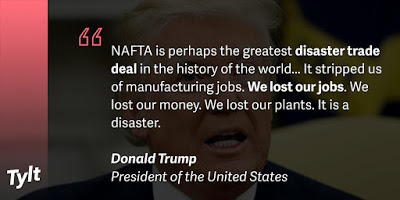
Donald Trump on NAFTA. That was then; this is now.
NAFTA 2.0 is on the horizon, and I wanted to offer an update courtesy of Public Citizen’s Trade Watch, the best go-to source on trade agreement issues. Their infographic is here. Click here for their full analysis. I’m excerpting the relevant details below.
Bottom line: The NAFTA 2.0 draft is a mixed bag and will need fixing. It does improve the original agreement, but not by much.
Public Citizen begins this way (emphasis mine):
NAFTA 2.0 Text Analysis
How does NAFTA 2.0 text measure up against the essential changes we have demanded to stop NAFTA’s ongoing damage?
After a year of North American Free Trade Agreement (NAFTA) renegotiations, the September 30 publication of a revised text revealed some improvements that progressives have long demanded, damaging terms we have long opposed and important unfinished business.
This NAFTA 2.0 text is not the transformational replacement of the corporate-rigged trade-pact model that we have demanded. But if we fight to get swift and certain enforcement of the pact’s new labor standards — and achieve some other key improvements — then the final package Congress will vote on early next year could stop some of NAFTA’s continuing, serious damage to people across North America.
Phase II of the battle to replace NAFTA and stop its ongoing job-killing, wage-crushing, environment-trashing destruction starts now!
Congress will vote on this agreement next year, providing Democrats with one more opportunity to show millennials that the Democratic Party is worth supporting in 2020. (Nancy Pelosi, take note: you’ll want to oppose this deal.)
“Investor-State Dispute Settlement” Clauses
I’ve written quite a bit about investor-state dispute settlement clausesin trade agreements. These provisions give “investors” (corporations) the right to sue “states” (sovereign nations) for lost future profits in special trade tribunals, whose decisions cannot be appealed in any nation’s court system. In effect, thanks to ISDS clauses, NAFTA court decisions trump the U.S. Supreme Court — a clear and obvious corporate attack on national sovereignty itself. ISDS clauses must be eliminated in their entirety.
Where does the current NAFTA draft agreement stand with respect to ISDS tribunals?
Corporate Powers and Privileges
We demanded an end to NAFTA’s Investor-State Dispute Settlement (ISDS) regime that grants corporations rights to attack our laws and demand unlimited taxpayer compensation.
So, some good, some bad. This is a critical issue; again, what’s at stake is national sovereignty versus corporate control. (Full Public Citizen analysis of this issue here.)
Job Outsourcing
Public Citizen wants an agreement that completely eliminates incentives to send jobs to other countries — in NAFTA’s case, to low-wage Mexico. How does the revised draft agreement measure up?
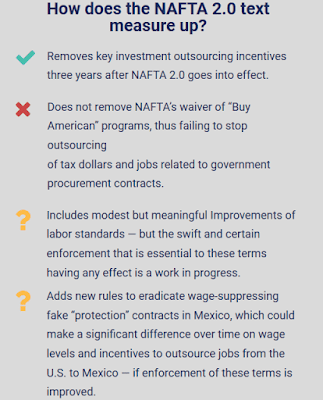
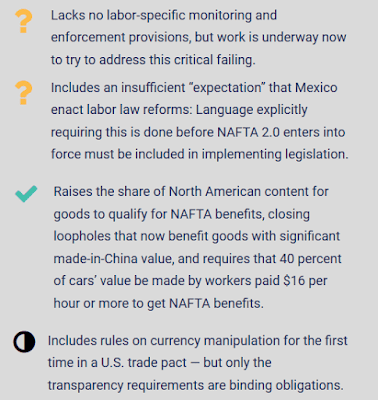
All those question marks above relate to provisions that are good but not enforceable. I’d make them X’s if I were doing the chart, but Public Citizen may be more hopeful than I am of getting them changed for the better. (More analysis of these items here.)
Climate Change and the Environment
The current NAFTA agreement was as terrible for the environment as it was for jobs. Using NAFTA tribunals, corporations could punish (or threaten to punish) nations, states, counties and municipalities for passing and enforcing environmental regulations that cut into corporate profits.
In the new agreement, some of that has changed — but only some:
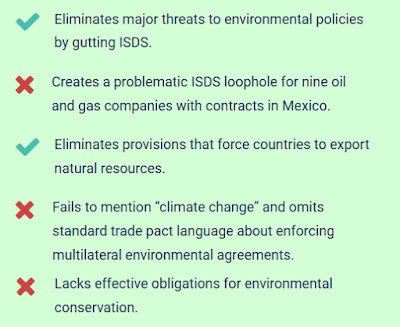
As you may have noticed, there’s nothing here about climate change.
Access to Affordable Medicine, Food Safety, Consumer Protection
On the issues of access to affordable medicine and food safety, the new agreement is terrible. About medicine, the new agreement:
- Grants Big Pharma new monopolies that lock in bad U.S. policies keep prescription drug prices high and imposes those policies on Mexico and Canada.
- Adds a new 10-year monopoly period for biologic medicines that could deny consumers affordable access to live-saving medicines.
- Grants additional Big Pharma handouts that block access to cheaper generic drugs.
- Includes rules for pharmaceutical firms to participate in government healthcare programs’ drug pricing and listing decision processes — but these terms are not enforceable.
A gift to Big Pharma, or a big wet kiss, depending on your degree of frustration. (More on the medicine clauses here.)
About food safety, same thing. The draft agreement:
- Maintains NAFTA terms that undermine domestic food safety and inspection policies and adds new limits.
- Maintains NAFTA rules that require the U.S. to accept food imports that do not meet U.S. safety or inspection standards.
- Maintains NAFTA’s limits on border food inspection and adds new rules limiting audits of NAFTA countries’ food safety programs.
- Fails to fix roll backs of U.S. food labeling policies that previously were trade-challenged by Canada and Mexico, including country-of-origin labels for meat and dolphin-safe labels for tuna. New terms could threaten GMO labeling.
Another wet kiss. (More on the food safety clauses here.)
About consumer protection from imported goods — in other words, can you trust imported products to meet the same standards for safety as domestic ones — there’s very little good to report. The draft agreement:
- Maintains old NAFTA rules that undermine consumer safeguards and adds more.
- Fixes a longstanding problem related to environmental and safety concerns with Mexico-domiciled trucks.
- Fails to include a new exception protecting public interest policies that are challenged as “illegal trade barriers.”
The second item above is a plus, but it’s minor compared to the rest. (More on the consumer protection clauses here.)
And of course, this agreement has no meaningful sunset clause.
All in all this is a very bad deal, though slightly better than the truly horrible deal the previous agreement represented. Anyone who thought that for all his flaws, Trump would at least come through on trade … was mistaken.
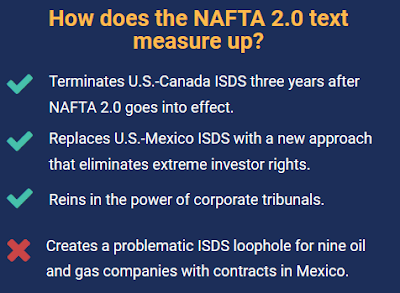


The PM of Canada was criticized by Trump saying: ‘The only problem with Justin is he loves his people, and he’s, you know, fighting hard for his people.’
Any country would be proud to have its leader “fighting hard for his people.”
I have a pretty simple view of free trade for the US.
We benefit from having stable neighbors with improving economies in many ways. So I would look to have much more free trade with neighbors like Mexico and Canada, even the rest of the Central American isthmus than with countries across the Atlantic and Pacific. Healthier neighbors are less likely to send us illegal immigrants and more likely to be good markets that are easily accessible.
Cheaper labor in Mexico can reduce the cost of our purchased goods while making a market for our goods. Neither Canada nor Mexico are looking to be geo-political rivals, unlike China.
I have been utterly baffled why we have outsourced the technologies for the future, such as computer chips etc., to China and other Asian countries. We should have been focused on establishing that manufacturing base in North America from both economic and military strategic perspectives.
So moves like increasing North American content in cars and setting an average labor rate for that content is where we should have gone in 1993.
Free trade has nothing to do with improving economies. And even if it did, it would be improving others at the expense of your own.
The first NAFTA paved the way for millions of poor Mexican farmers to be thrown off their land and led to the greatest emigration wave in Mexican history, setting off the border paranoia that we’re still living with in the US.
Just Google Zapatistas EZLN, the guerilla movement set off by NAFTA, to get an idea of what that agreement did to Mexico’s poorest.
No. Free Trade destroys jobs in America and farm livelihoods in Mexico exactly as intended and designed, on purpose.
There should be no Free Trade ever, anywhere.
Free Trade is the New Slavery.
Protectionism is the New Abolition.